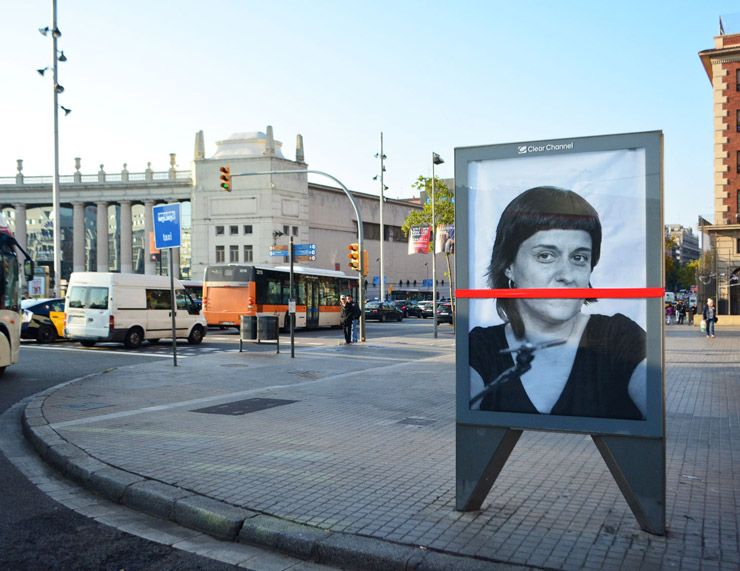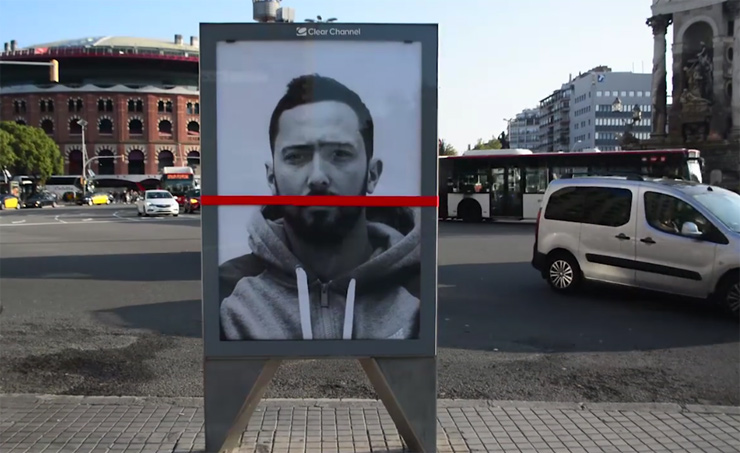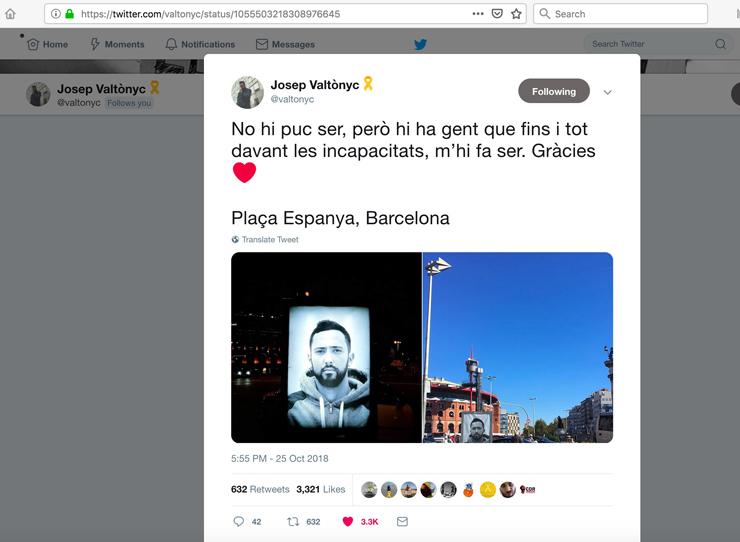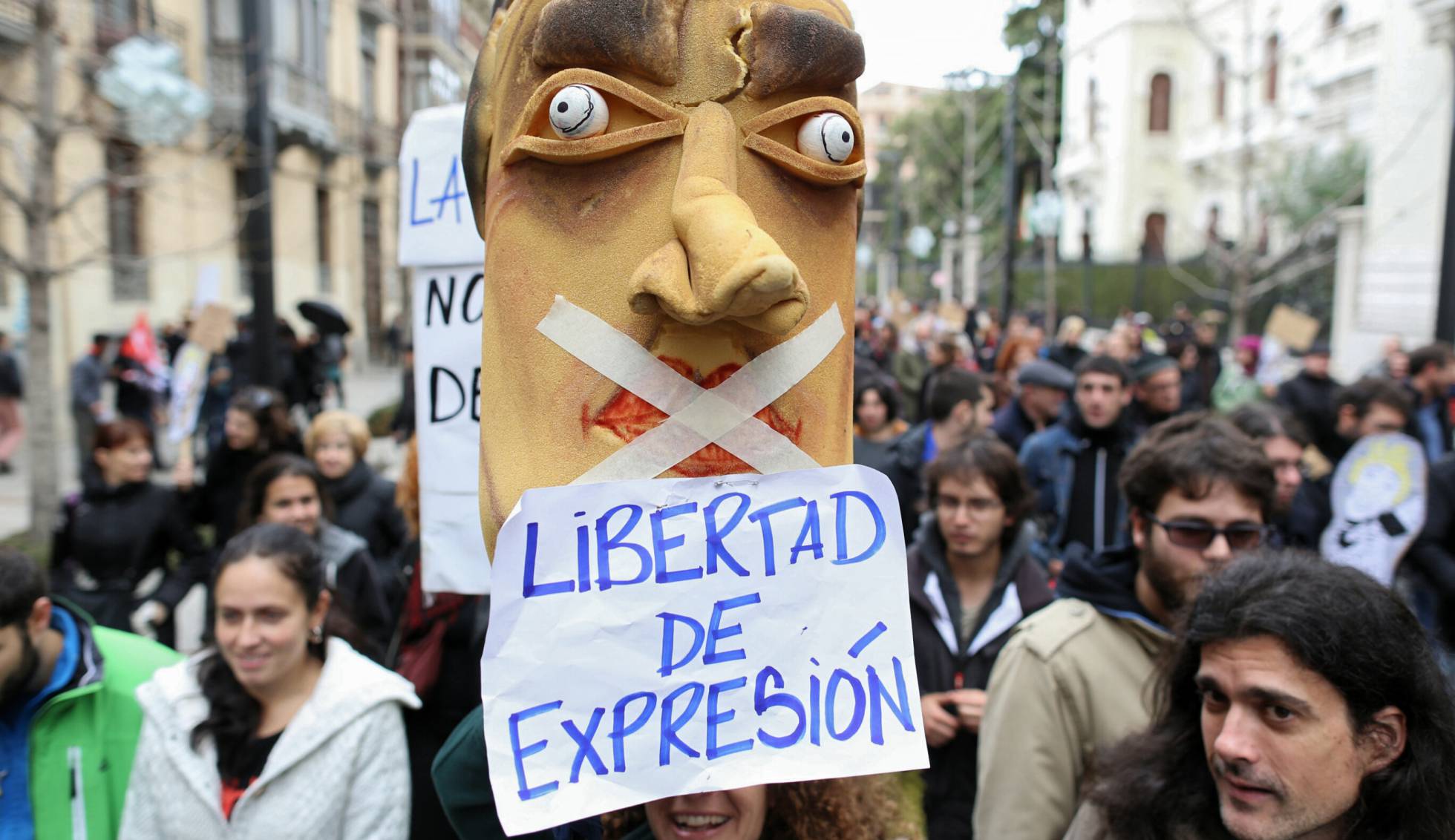‘The Gag Law made me do it!,” says Street Art activist and social commentator Bill Posters as he talks about his new kiosk takeovers in Placa Espanya, Barcelona. The large black and white photographs are of two free speech advocates arrested for offending ‘Ley Mordaza’ in Spain – a curious concoction of restrictions passed as law 3 years ago that most people would tell you are clearly repressive and are frankly difficult to believe would last for long in a European country.
Including restrictions on photographing police, organizing on social media, public protesting, even leaving furniture in the street (?) (a tradition), in the first seven months of the law being passed 40,000 sanctions were imposed, according to statistics from the Ministry of Internal Affairs on the website European Center for Press and Media Freedom. Euroweekly says that the current average is 80 citations per day. Although some of those cases have been overturned and El Pais says the government has been backtracking on these laws recently.

Bill Posters. Portrait in Exile 2 – Anna Gabriel. ‘Lay Mordaza Me Obliga’ / ‘The Gag Law Made Me Do It’. Intervention in Placa Espanya. Barcelona, Spain. October 2018 (photo © Bill Posters)
Article 578, known as ‘Ley Mordaza’ (the ‘gag law’) has been condemned by Amnesty International and is symbolized in these Street Art pieces by the piece of red tape that goes across the subjects’ mouths. Mr. Posters tells us he intends it to be an interactive piece that the public can remove the tape themselves, symbolically allowing the subject to speak. This act of de-censorship is a novel idea and in fact someone recently did that and photographed it (below).
The artist tells us more details about the two subjects, who he says are, “taken hostage by the Spanish state’s legal apparatus that is increasingly designed to silence both political and cultural dissent.”
Anna Gabriel: “After the holding in 2017 of the Catalan independence referendum, called by the Generalitat de Catalunya, and declared illegal by the Constitutional Court of Spain – the former spokesperson for the Catalan pro-Independence campaign, was called to appear in front of the Spanish Supreme Court to give evidence about her participation in those events. On February 20th, 2018, she stated in an interview to Le Temps that she would not show up for her court hearing, while in a self imposed exile in Switzerland.”

Bill Posters. Portrait in Exile 1 – Valtònyc. ‘Lay Mordaza Me Obliga’ / ‘The Gag Law Made Me Do It’. Intervention in Placa Espanya. Barcelona, Spain. October 2018 (Screen grab from the video)
Valtònyc: “A vocal pro-independence rapper from Catalonia was sentenced to 3 years in prison in March 2018 for lyrics that contained (alleged) glorification of terrorism, slander, ‘lèse-majesté’ (defamation against the crown), and threats.”
Here at BSA we don’t pretend to know all of the history or innerworkings of Spain and Catalonia – or Brooklyn for that matter – but we do worry seriously when we hear about artists being silenced and jailed for speech – and you should too.
Through a third party BSA was able to send a few interview questions to the twenty-four year old Catalonian rapper Valtònyc, who is featured in one of these Street Art pieces and who Belgium recently refused to extradite. With a number of “western” societies going in a hard-right direction politically, we wanted to understand how a country like Spain could have passed these recent laws and how they are affecting artists – those weirdos who usually are the first to test the limits of free speech.
Edited for clarity and brevity, these are the answers we received back:
BSA: Democracy returned to Spain in 1977, yet 41 years later you were convicted by the Supreme Court of Spain for exercising your rights to express your opinions not only as a citizen but as an artist. How is it possible that a member state of the EU, one that bills itself as a democratic state, can rescind freedom of speech among its citizens?
Valtònyc: Being condemned for a song lyric is not the most serious thing that happens in Spain. Since the beginning of the supposed “democracy”, Spain has the only general secretary of a communist party in prison under a life sentence. Now he is also joined by the president of ERC and the ministers of Catalonia without trial and with accusations of up to 30 years for rebellion.
In Spain, multiple daily newspapers, websites and illegal political parties have also been closed. All this while Europe watches. We are not a bourgeois democracy like other countries in Europe, we are a fascist state and it is demonstrable.

The above photo of the installation shown without the red tape was sent to Valtonyc (the Catalonian rapper in exile) which shows his portrait with the red tape removed. “Someone, an unknown member of the public transgressed the boundary from observer to participant which is what the project intended!” Bill Posters
BSA: What about democracy? What’s happened to the Spanish Institutions that were created after the dictatorship to protect the rights of its citizens?
Valtònyc: In a democracy, institutions are there to serve citizens. In Spain they only serve to condemn them. There are 20,000 people affected by the ‘gag law’. When there is a wave of organization and demonstrations, they respond with repression.
It is curious that they never condemn fascists or Nazis and that the accused are always communists and anarchists. The constitutional court does not respond to violations of the constitution, such as my sentence and that of the remaining 15 rappers. Is not freedom of expression a constitutional right?
BSA: Do you think the current state of Spain is a direct consequence of corruption?
Valtònyc: Brussels recently has shown that Spain is the most corrupt country in Europe. Of 1400 corrupt politicians, only 70 have entered prison and none of them has served their sentence in full. Worst of all is corruption within justice – how judges paralyze investigations of political parties or destroy evidence of illegal financing. It’s a disaster.
BSA: Do you see other young people like yourself being aware of the social issues and the struggles facing Spain now? How are they getting involved to help create a better country?
Valtònyc: Every day people are more aware of what is happening in the Spanish state and are organized or mobilized. There are never enough, but as in France, we in Spain also have examples of organization and struggles that have ended in victory. There are the examples of Gamonal, the train of Murcia, or the miners of Asturias. It shows that the people united and on the street, not only on the Internet, can preserve all the rights they try to take away from us. History proves this as a fact and it has never changed.

(photo © Pepe Marín)
BSA: Do you think most young people in Spain view the Spain of Franco as something in the distant past and see no connection between his 35 years in power and the concerns of contemporary Spain?
Valtònyc: I believe that many people are aware of the rise of the extreme right throughout Europe; how the extreme right takes advantage of the weaknesses of the popular classes in their speeches and thus wins their sympathy. The problem is that we do not organize ourselves to stop fascism and then we are surprised that in the elections they win so many votes. Fascism advances if it is not fought and it is a pity that people do not understand that this is more than a simple slogan.
BSA: Do you think artists must take a position with their art to lead a revolution for change? What is the part that art plays during times of social unrest and injustice?
Valtònyc: I believe that art has to be a tool for social transformation; a hammer to shape reality. All art is political, many people think not, but that’s the way it is. Your art can serve the oppressor or the oppressed class, but it is impossible to stay out of politics. Now in the HipHop scene the Trap sound abounds and the political rap is not so notorious, but we still remain combative rappers in the trenches – especially in South America and in France.
Other Articles You May Like from BSA:
Reality TV is usually completely devoid of reality. That isn’t the exact comparison Andreco said on his Facebook page but we thought it was a fitting analogy. Street Art in a museum or gallery can som...
Our weekly focus on the moving image and art in the streets. And other oddities. Now screening:1. Marina Capdevila. Los Pajaritos. Granada, Spain2. Marina Capdevila. Shine Festival. St. Peters...
Celebrity, photorealism, illustration, fantasy, spectacle. These have always been part of popular art culture and have had an increasingly strong representation in Street Art culture, particularly in ...
We’re pleased today to bring new works from David Walker in studio as he prepares for his first US solo show at Black Book Gallery in Denver, "Shake Your Skin Loose". A departure from his style that m...
Welcome to BSA Images of the Week! Here is our weekly conversation with the street, this week including Dan Witz, Okek, Ian Mutch, ATOMS, Lover, Senk, Greks Steffi, ZAPS, Solito, and Bley. ...
 BROOKLYN STREET ART LOVES YOU MORE EVERY DAY
BROOKLYN STREET ART LOVES YOU MORE EVERY DAY










